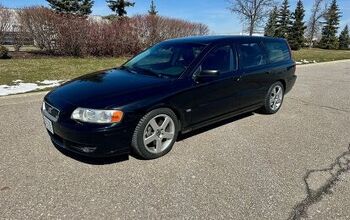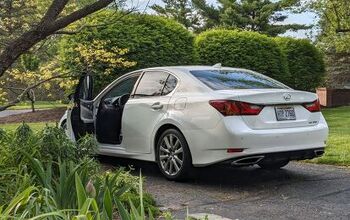Shockingly, Some Would-be Model 3 Buyers Would Rather Drive a Non-Tesla EV That's Available Now

Despite the fandom surrounding all things Elon Musk, there are still some electric car shoppers who’d rather drive than wait. It also seems that, when weighing a prospective Tesla Model 3 purchase, some consumers are willing to let price sway them to another car with a similar driving range.
None of this should come as a shock to those not immersed in blogs and forums devoted to championing Tesla as the sole agent of change in the automotive sphere, and the only “pure” solution to Earth’s problems. To some true believers, however, these shoppers could be seen as traitors to the cause.
That’s their problem. For General Motors, Tesla’s loss of customers is the legacy automaker’s gain.
As we’ve told you before, assembly line issues forced two walkbacks of the company’s Model 3 production target. Originally forecasted to hit 5,000 vehicles per week by the end of 2017, Tesla now says its Fremont factory will reach that number by the end of June 2018. That’s led to a pushback in delivery dates for reservation holders.
The Model 3 comes in two flavors: a base, $35,000 sedan with a 220-mile range, and a $44,000 Long Range model. In the interest of income, the pricier model got first dibs on the company’s slow-to-ramp-up production line. Earlier this month, Tesla informed those who put $1,000 down on a base Model 3 on the first day of reservations (March 2016) that their delivery date was being pushed back to the end of 2018. Some who reserved the following day were told their delivery date will be in early 2019, Bloomberg reports.
For those buyers, and especially those who reserved a Model 3 well after the launch, there’s another problem. While waiting months and years for a new vehicle is annoying, the thought of paying extra once it does arrive is even more of an incentive to shop elsewhere. Some reservation holders worry the federal EV tax credit will dry up before that new car shows up at their door.
At Tesla’s projected production rate, the automaker is expected to use up its share of $7,500 tax credits before the end of the year. After that date, the incentive shrinks by half for the next six months, then again, before disappearing entirely. That means a base Model 3 could rise in price by $3,750 or more by the time it’s delivered. Buyers might find themselves on the hook for the whole $35,000.
According to Reuters, the recent pushback in delivery dates is compelling some reservation holders to look at a 238-mile Chevrolet Bolt instead. The news agency reports GM dealers in EV-friendly California have seen an increase in interest from Tesla shoppers. Many would-be buyers have also expressed their intentions online.
“We’re getting the Tesla people who wanted their Model 3,” said Yev Kaplinskiy, a GM dealer located in that sweet spot between San Francisco and Silicon Valley. “We ask them, ‘What other cars are you interested in?’ They’re mostly Tesla. But they want the car now. They don’t want to wait.”
One TeslaMotorsClub.com forum poster, who claimed to be an early reservation holder, bemoaned the lengthy wait after receiving notice of the delay. “My objective…was always a $35,000 Tesla for the price of a decently optioned Civic (with full federal tax credit),” wrote poster 206er.
GM sold 23,297 Bolts in 2017, with the model becoming available nationwide last summer. While a base Bolt starts at $37,495, they’re readily available, and GM won’t hit its tax credit production limit until well after Tesla, ensuring current buyers the full $7,500 incentive.
Sure, many die-hard Tesla fans will wait however long it takes to get their hands on a Model 3. For others, though, brand loyalty has a limit.
In a survey of 1,058 car shoppers conducted by Autolist, 37 percent of respondents said they would look elsewhere for a car after waiting for a period of 12 to 18 months for a Model 3. (That’s the time frame Tesla cites after a Model 3 deposit). Another 34.4 percent said they would tolerate a delay of three to six months after the 18-month period before cancelling their reservation and asking for a refund.
[Image: Tesla]

More by Steph Willems
Latest Car Reviews
Read moreLatest Product Reviews
Read moreRecent Comments
- Funky D The only piece of technology introduced in the last 10 years that is actually useful is the backup camera. Get rid of the rest. All I want is a car with that and phone connectivity and zero driving nannies.
- TheMrFreeze As somebody who's worked in IT for my entire career, I don't want any computer automatically doing something of this nature on my behalf. Automatically turning on my headlights? Sure (and why hasn't THAT been mandated yet). Automatically braking, or steering, or actually driving my car for me? Not an effing chance...I've seen computers do too much weird stuff for no reason to trust my life to one.
- Daniel J Our CX-5 has hit its automatic brakes a few times at in very unnecessary situations. My 2018 doesn't have it, but it will shake and throw a warning if it thinks you should brake. Only once was it needed. The dozen or so times it has gone off I was already on the brakes or traffic was in a pattern that just fooled it.
- Kosmo This would become interesting with a turbo and 6MT.
- CanadaCraig 'Afraid' is the wrong word. The question should be, "Do you trust autonomous cars to get you from point A to point B and all points in between safely?" And my answer to that question is 'NO'.

































Comments
Join the conversation
With GM’s well documented failures when it come to new technology, I could never invest in any GM. Once burned , twice shy? In any case everyone has the right to spend their dollars as they choose. Electric car advancements are very likely to continue an if solid state batteries live up to the hype , it probably would be smart to wait.
If the Kia Niro EV was available today, I'd cancel my Model 3 reservation immediately and go buy one. I may cancel anyway, because of the high price and the terrible driver interface, where 95% of the functions go through a GUI. I'm also not interested in being branded with the Tesla logo. I was interested in the car for its long range, performance, and good looks. As others have noted here, the anti-Tesla trolling by TTAC has probably exceeded the GM bashing during its 2009 meltdown. It fits the definition of envy. There is a regularity to the glee at TTAC to see Tesla fail. TTAC is gradually diverging from being "The Truth About Cars".